- AI in business automates tasks like data analysis, lead scoring, and customer support, cutting costs and freeing teams to focus on strategy.
- Businesses see real gains from AI: 52% lower labor costs, faster insights from messy data, and the ability to scale operations without adding headcount.
- Success with AI starts by pinpointing one clear problem to solve, choosing tools that integrate with existing systems, and training teams in data literacy and prompt writing.
Between the viral hallucinations and overhyped promises, it’s easy to lose sight of what AI is actually doing in the real world — especially in the business of AI, where enterprise chatbots are already transforming how companies operate.
In fact, 77% of companies are already using or exploring AI, and 83% say it’s a top priority in their business plans.
In this article, I’ll cut through the noise to look at the use of AI in business and why it's the key to turbo boosting businesses.
What is AI for business?
AI for business refers to the use of artificial intelligence technologies to improve how organizations operate and deliver value. It’s used to streamline workflows, analyze data, personalize customer experiences, and support more informed decision-making.
Rather than being limited to one department, AI spans functions across the business, helping teams work more efficiently.
Why does AI matter in business?
It’s no surprise adoption is rising: McKinsey reports that AI use in business operations has doubled since 2017, and companies expect their investment in AI to keep growing.
AI gives companies a competitive edge by helping them work faster and make smarter decisions.
Types of AI Used in Business
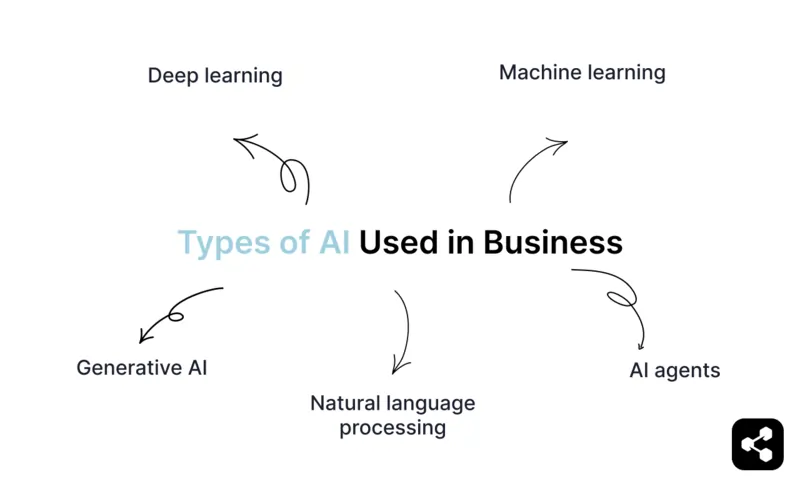
Machine learning
Machine learning focuses on enabling systems to learn from data and make decisions without being explicitly programmed.
Instead of following fixed rules, these systems identify patterns in large datasets and gradually improve their ability to make predictions or flag unusual activity.
For instance, a machine learning model can help a business forecast future revenue or flag odd transactions. It’s especially effective when provided with labeled examples (data that humans have already categorized) so it knows what to look for.
Natural Language Processing (NLP)
Natural language processing (NLP) enables computers to interpret and generate written and spoken human language.
It’s what allows machines to work with language in ways that feel natural and is built to handle unstructured inputs: text from emails, voice commands, support tickets, transcripts, social media posts, and more.
NLP powers a wide range of tools, including:
- AI chatbots and virtual assistants that handle customer inquiries or guide users through tasks
- Voice assistants like Alexa, Siri, and Google Assistant
- Auto-correct, predictive text, and grammar tools in applications like Gmail or Microsoft Word
- Translation services like Google Translate or DeepL
- Speech-to-text systems used in captioning, voice commands, or transcription services
Combined with machine learning and deep learning, NLP can dig into huge volumes of messy, unstructured language data and pull out valuable information.
Deep learning
Deep learning is a type of machine learning that uses large, layered networks, called neural networks, to learn from data in a way that mimics how the human brain works. These networks are made up of many layers of simple processing units that work together to recognize patterns.
What makes deep learning special is that it learns directly from raw data like images, sound, or text, and teaches itself how to make sense of it. Each layer in the network builds on the last: early layers might detect edges in a photo, while deeper layers can recognize an entire face.
Because of this, deep learning is especially powerful for complex tasks. It’s used in things like facial recognition and spotting credit card fraud. It’s also behind many recent advances in AI, including self-driving cars.
Generative AI
Generative AI creates new content like text, images, music, or code, by learning patterns from existing data.
It uses deep learning models, especially large language models, to understand structure and style, then generate original outputs in response to prompts.
You’re probably familiar with tools like ChatGPT, DALL·E, or MusicLM – these are all examples of generative AI in action.
Agentic AI
AI agents are softwares designed not just to generate content or respond to prompts, but to take purposeful action toward a specific goal.
Examples of AI agents in action include:
- Monitor a data pipeline and automatically alert an engineer when key metrics drop
- Scan multiple calendars, find open time slots, and schedule a meeting
- Research product pricing across websites and make purchase recommendations
- Log into a customer support platform, escalate a ticket, and generate a summary for the team
Unlike chatbots that rely on back-and-forth instructions, agentic AI is defined by its autonomy. It can figure out what needs to happen and how to make it happen, adjusting its behavior based on outcomes.
5 Benefits of AI in Business
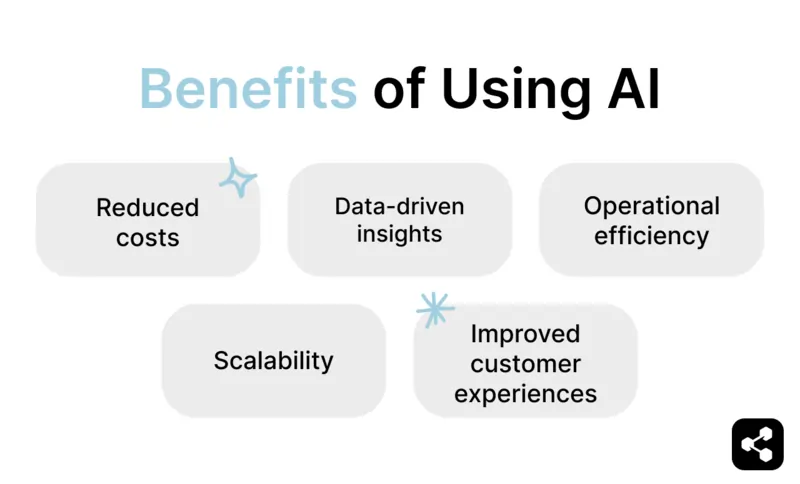
1. Reduced costs
Companies using AI report a 52% reduction in labor costs.
That’s because AI automates time-consuming tasks like data entry, scheduling, and handling common customer requests. Instead of hiring more people to manage this work, teams can rely on AI to do it instantly, around the clock, and without breaks.
2. Data-driven insights
AI helps businesses make sense of large, messy datasets no matter if it's customer feedback, sales activity, or support logs. Instead of manually analyzing spreadsheets or reports, teams can use AI to automatically detect patterns, surface key trends, and highlight what needs attention.
Let me give you a home-grown example. At Botpress, my team uses a bot to uncover sales opportunities by scanning product usage data.
It connects to Mixpanel, HubSpot, and our internal platform to monitor signals like API spikes or surges in active users. When it spots high-intent activity, it pings the right salesperson on Slack with context and a recommended next step.
As you can imagine, this would be nearly impossible (and incredibly tedious) for a human to do. AI lets us catch key moments as they happen, so we can act faster.
3. Operational efficiency
AI boosts efficiency by taking over repetitive, time-consuming tasks. It can generate reports, schedule messages, manage workflows, or trigger follow-ups all without manual effort.
As a result, teams can shift their focus from micromanaging tasks to driving strategy. It’s no surprise that 63% of companies using AI report improved efficiency across their operations.
4. Scalability
As companies grow, so does the workload. But that doesn’t mean you need to rush out and double your team size. AI can scale along with you.
For example, AI lead generation can scale effortlessly as inbound interest increases. They automatically qualify prospects and route them to the right teams, no matter how many leads come in.
Here are some other ways AI can scale alongside a company’s growth:
- Handle increasing volumes of support tickets or FAQs without needing more employees.
- Automate training for new users or employees with AI-powered guides and chatbots.
- Manage benefits questions, PTO requests, or policy explanations for a growing team.
- Handle routine tech issues and password resets as your headcount expands.
5. Improved customer experiences
Adoption is accelerating quickly: Gartner projects 80% of customer service teams will use generative AI to enhance the customer experience. That’s because AI can handle high volumes of requests, personalize interactions, and resolve issues instantly.
For example, an online retailer can deploy an AI chatbot to recommend items based on browsing history and instantly handle tasks like tracking orders, processing returns, or updating shipping information.
How much does AI for a business cost?
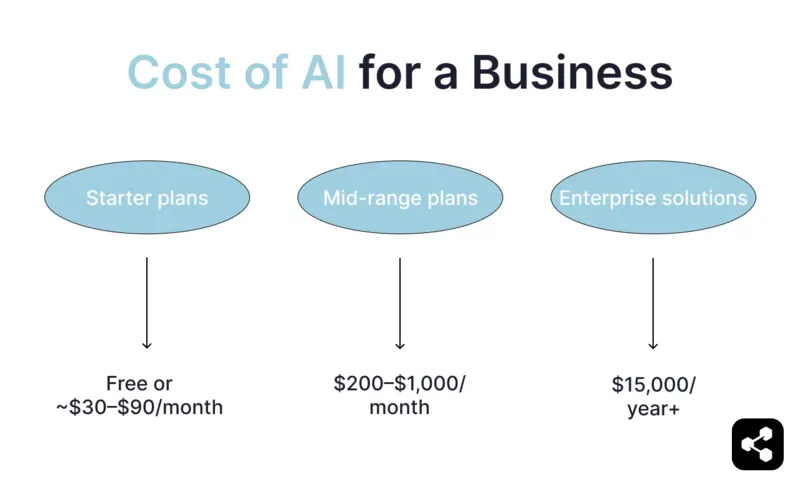
Cost of starter AI solutions
If you want to experiment with an AI agent for your small business and just need a no-fuss way to dip your toes into AI, you can find basic plans for free or scale up to $30-$90 dollars a month.
These starter options typically offer basic automations and light analytics. They’re a great way to try out AI without spending much, whether it’s a lead gen bot, a customer service helper, or a simple HR assistant.
Cost of mid-range AI solutions
Now if you're looking for something a bit more advanced, mid-tier AI plans typically range from $200 to $1,000 per month, depending on the features included.
These plans usually support more advanced use cases like custom workflows, deeper analytics, integrations with third-party tools, and higher usage limits.
Cost of enterprise AI solutions
On the enterprise side, pricing generally starts at $15,000 per year and goes up based on scale and customization needs.
These plans often include things like advanced analytics, audit logs, custom SLAs, and hands-on support from technical specialists.
Applications of AI in Business
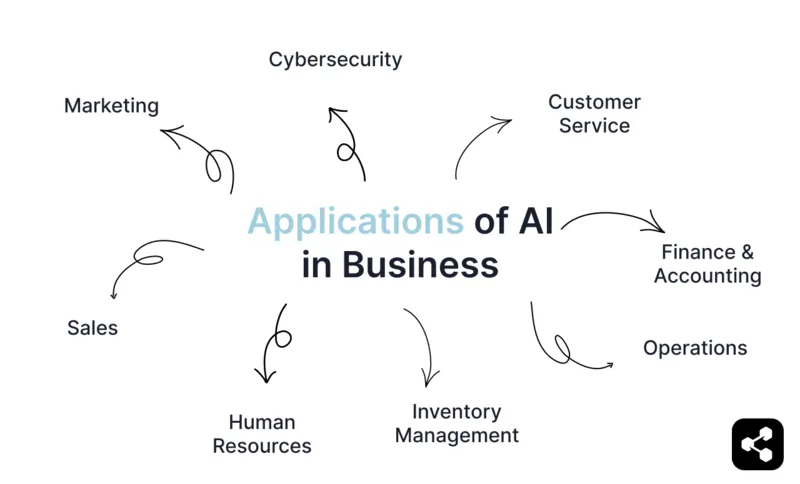
Marketing
Marketers can move faster with digital marketing AI agents to improve how campaigns are planned and executed. It allows teams to work more efficiently and deliver more relevant experiences to customers.
Here’s how AI is transforming marketing today:
- Predict customer behavior with models that forecast churn or conversion likelihood so teams can intervene or double down at the right moment
- Generate and personalize content at scale tailored to each audience segment
- Create audience segments by analyzing real-time behavior like website activity, campaign engagement, and product usage
- Automate A/B testing by optimizing CTAs and timing based on live performance
- Forecast campaign outcomes using historical data to estimate engagement and ROI before anything goes live
Sales
AI helps reps close more deals by analyzing behavioral data to predict which leads are most likely to buy. Tools like sales chatbots assign scores to prioritize those prospects, so reps spend less time chasing dead ends and more time on high-intent leads. The result: shorter sales cycles and higher win rates.
AI can support sales teams in a number of ways:
- Automatically score and prioritize leads based on behavior, fit, and intent
- Keep CRMs up to date by logging interactions and tracking deal progress
- Identify upsell or cross-sell opportunities by analyzing usage patterns and purchase history
- Predict churn risk or deal likelihood to help reps focus where it counts
- Recommend next-best actions like when to follow up or what message to send, based on deal stage, historical outcomes, and buyer behavior
- AI lead generation qualifies prospects and routes them to the right teams
One example: Waiver Consulting Group deployed an AI assistant that greeted site visitors, booked consultations, and synced with calendars which boosted consults by 25% in just three weeks.
Cybersecurity
AI plays a crucial role in cybersecurity by detecting and responding to threats in real time. It monitors network activity for unusual patterns — like phishing attempts or unauthorized access — and flags issues as they emerge.
Here, AI detects subtle anomalies and adapts to new attack methods. It reduces false positives and can automatically trigger containment measures, minimizing damage before human teams step in.
According to the Ponemon Institute, 70% of cybersecurity pros say AI is highly effective at catching previously undetectable threats.
Human Resources
When it comes to HR, AI — especially HR chatbots — makes a real difference by handling the everyday questions that can pile up quickly, like “How much PTO do I have left?” or “Where’s that onboarding doc again?” Instead of waiting on a response, employees get answers instantly.
Here at Botpress, we use a Slack bot called Harry Botter (yes, really) that acts like a 24/7 HR assistant. It helps the team with everything from policy lookups to payroll calendars to onboarding reminders. It’s saved our team countless hours and made life a lot easier for the rest of us, too.
Inventory Management
AI keeps inventory in check by analyzing stock levels, demand trends, and purchasing patterns. It alerts teams before issues arise, helping prevent overstock and stockouts.
Zara, for example, uses AI to monitor global fashion trends and adjust production quickly — helping them increase sales by 7%.
Customer Service
Customer support is being transformed by AI to deliver instant, accurate assistance 24/7. They handle routine questions and resolve issues autonomously. The result: faster responses, fewer backlogs, and higher customer satisfaction.
Unlike traditional bots, customer service AI chatbots can interpret intent, reference knowledge bases, and complete tasks. Over time, they learn from interactions to improve speed, precision, and customer experience.
Take Able, a personalized health coaching platform. By integrating an AI chatbot to handle routine customer inquiries, they cut down 65% of manual support tickets and saved over $50K annually in support costs.
Finance & Accounting
In accounting, AI can handle tasks like invoicing and expense categorization, automatically flagging anomalies and reducing human error. This speeds up month-end close and helps teams focus on higher-level analysis.
In finance, AI supports more strategic work. It can forecast cash flow and model different financial scenarios. Rather than manually piecing together insights from spreadsheets, finance teams can use finance chatbots to surface key metrics automatically.
Operations
AI improves operational efficiency by automating repetitive tasks like document processing and data entry. It keeps workflows moving without manual input, freeing up ops teams to focus on process improvement.
At Botpress, for example, we use AI survey bots to process internal feedback. They scan responses, detect patterns in tone and sentiment, and generate structured summaries, turning hours of manual review into just minutes of insight.
What’s the future of AI in business?
AI is changing how we work. As a result, jobs are leaning towards higher-value skills like strategy, creativity, critical thinking, and collaboration. In most roles, AI will act as a co-pilot, enhancing productivity and decision-making.
This shift means jobs will look different. AI won’t just be used by specialists but it’ll be built into the everyday tools most professionals rely on.
New AI-specific roles are emerging too like prompt engineers and AI ops specialists. The World Economic Forum estimates 97 million AI-related jobs will be created by 2025.
Adapting means building new skills like data literacy and using AI tools. As with the internet, AI is redefining what it means to be skilled in today’s workplace.
Ethical Considerations of AI in Business
As AI becomes more common in business, it brings ethical challenges like how to protect user privacy, avoid bias in decision-making, and ensure accountability when things go wrong.
And it’s not just a backend issue: 85% of consumers say it’s important for organizations to prioritize ethics when using AI to tackle real-world problems, according to a study by IBM.
Handling data responsibly starts with clear policies around data collection, storage, and use. That means being transparent about what’s collected, getting proper consent, limiting access, and using anonymization to protect user identity.
Bias in AI doesn’t come out of nowhere. It usually stems from biased training data or flawed assumptions built into models. To avoid it, companies should audit their data sources, test models regularly for fairness, and involve diverse teams in the development process. Tools for monitoring are also key to spotting and fixing bias early.
Ultimately, staying aware of AI's limitations are all part of building AI systems that are both effective and ethical.
8 Best AI Tools for Business
1. Botpress

If you want to build AI-powered chatbots or automate workflow, Botpress is a leading AI agent building platform designed specifically for that.
It goes far beyond simple chatbots. Whether you’re looking to reduce support volume, automate repetitive tasks, or streamline internal operations, Botpress offers the flexibility and depth to handle it.
With built-in analytics, debugging tools, and a visual flow builder, teams can ship and iterate quickly without a big dev team.
Key features
- Visual flow builder
- Natural language understanding (NLU)
- Multi-channel support
- Pre-built library of integrations
- Built-in analytics and debugging tools
Pricing
Botpress offers a free plan with core features, along with paid plans for larger teams starting at $89 and going up to $495.
2. Lucidchart
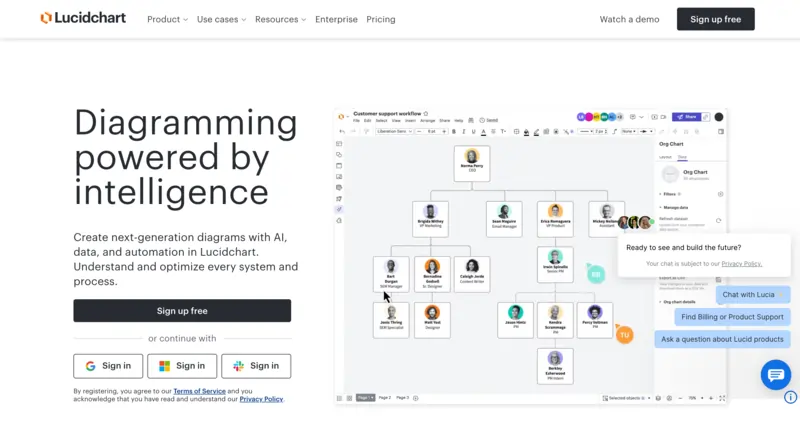
If you’re in the planning phase and want to map out how your chatbot should work before building anything, Lucidchart is a go-to tool.
It’s an intuitive diagramming app that lets you sketch out chat flows, decision trees, and technical workflows with simple drag-and-drop tools. It’s perfect for visualizing logic, spotting potential issues, and getting feedback from your team early in the process, no coding required.
Key features
- Drag-and-drop flowchart builder
- Templates for user journeys, logic maps, and system architecture
- Real-time collaboration and commenting
- Easy embedding and sharing
Pricing
Lucidchart has a free plan with basic functionality, and paid plans start at $7.95/month for individuals and $9/user/month for teams.
Enterprise pricing is also available for larger organizations that need advanced features and integrations.
3. Coveo

Coveo helps businesses deliver smarter, more personalized digital experiences using AI-powered search and recommendations.
Whether you're running an ecommerce site or support portal, Coveo uses machine learning to surface the most relevant content right when users need them.
It’s especially valuable for companies with large catalogs or complex customer journeys.
By tailoring search results and recommendations in real time, Coveo improves findability, boosts engagement, and drives higher conversion rates without manual effort.
Key features
- Smart search
- Product recommendations
- Personalization engine
- A/B testing & analytics
- Integrations
Pricing
Coveo provides a free trial, but pricing isn’t publicly listed. Companies will need to contact sales for a custom quote based on their requirements.
4. HubSpot

HubSpot is already a go-to platform for managing sales and marketing. Now it offers built-in AI features that enhance what teams are already doing. Rather than overhauling your stack, it lets you layer AI into existing workflows.
AI-powered tools help with lead qualification, meeting scheduling, content creation, and CRM automation which is ideal for teams that want to start using AI without a steep learning curve.
Key features
- Integrated AI agents for lead qualification and scheduling
- CRM automation to reduce manual work
- Unified workflow across sales, marketing, and service
- Reporting and analytics to track performance
Pricing
HubSpot gives users a free plan to get started, with paid plans beginning at $20/month.
Professional and Enterprise tiers include more advanced features and can reach up to $3,600/month depending on usage and team size.
5. Yellow.ai

Yellow.ai is an AI automation platform designed for large organizations that need scalable, multilingual chatbots.
Its no-code/low-code builder makes it accessible for non-developers, and with prebuilt templates and integrations, teams can quickly launch bots tailored to their needs.
Yellow.ai is ideal for enterprises looking to streamline support and reduce operational load at scale.
Key features
- Pre-built chatbot templates and integrations
- Support for 100+ languages
- Campaign management tools
- Insights and analytics dashboards
Pricing
Yellow.ai offers a free plan with 1 bot, 2 channels, 1 custom API, and 1 active campaign.
Enterprise plans include unlimited bots, channels, APIs, and more, with pricing based on specific business needs.
6. IBM watsonx Assistant

IBM watsonx Assistant is a conversational AI platform designed to build virtual and voice assistants for customer service applications.
It leverages large language models to learn from customer interactions, aiming to improve issue resolution efficiency and reduce customer wait times.
Unlike traditional chatbots, watsonx Assistant can query knowledge bases, seek clarifications, or escalate to a human agent as needed. It’s adaptable for use in various environments, including cloud and on-premises setups.
The platform also offers voice capabilities, allowing integration into telephonic customer support systems.
Key features
- Agent assistance
- Artificial intelligence integration for better customer understanding
- A range of integrations with existing tools
- Enhanced security measures
- A visual builder for easy chatbot creation without extensive coding
Pricing
IBM Watson Assistant has a Lite free plan, a Plus plan starting at $140/month, and customizable Enterprise pricing. Additional costs apply for more integrations, monthly active users (MAUs), and resource units (RUs).
7. Kore.ai

Kore.ai provides a multifaceted AI chatbot platform designed for enterprises and small businesses.
The platform stands out with its no-code approach, enabling users to create intelligent virtual assistants (IVAs) without coding skills. It also offers low-code options for deeper customization.
Kore.ai also focuses on security and compliance, crucial for sensitive sectors like banking and healthcare.
The platform's adaptability across different industries helps businesses streamline processes and enhance customer interactions.
Key features
- Support for over 120 languages and channels
- Pre-built bots for various industries
- Advanced dialog management
Pricing
Kore.ai provides a free trial for companies to evaluate the platform.
Paid plans include Standard and Enterprise tiers, with pricing customized based on business needs. The Enterprise plan adds unlimited notifications, dialogues, FAQs, and boosts the request rate limit from 200 to 1,200 per minute.
8. LivePerson

LivePerson provides voice and messaging capabilities in their chatbots, and allows users to integrate their bots with other communication channels.
Their chatbot app features human-like conversations with advanced conversational AI, generative AI, and voice AI abilities, all hosted on their Conversational Cloud. Their product is adept at digitizing voice conversations for your website visitors.
LivePerson has third-party partnerships that support an omnichannel conversational suite, giving your bot the ability to connect to your data with Avaya and Amazon Connect.
Key features
- SSO sign-in
- Multi-language support
- Multi-channel deployment
- Built-in safety tools
Pricing
LivePerson offers two pricing plans, and unlike other platforms, it prices by resolutions, not individual add-ons like seats or minutes. Their price also differs based on whether you want to use their conversational cloud alone, or in conjunction with their generative AI capabilities.
For specific prices, users need to reach out to the LivePerson sales team.
Build an AI Agent for free
AI is the tool people are using right now to work smarter. The real question is: what will you build with it?
With Botpress, you don’t need to be a developer to create powerful AI agents. The platform is designed so anyone can jump in and launch something that actually works — no code required.
Whether you’re looking to automate support, boost productivity, or build something completely custom, Botpress gives you everything you need to get started.
Start building today. It’s free.
FAQs
How do I know if my business is ready to adopt AI right now?
Your business is ready to adopt AI if you have a clear problem that costs time or money, enough digital data related to that problem, and the willingness to experiment with new tools and train your team, even if you start small with just one use case.
Is AI only suitable for tech companies, or can traditional industries benefit too?
AI isn’t only for tech companies, traditional industries like manufacturing, retail, healthcare, and logistics all benefit by using AI to optimize supply chains, predict maintenance issues, personalize customer experiences, or detect fraud, making it valuable across every sector.
What’s the difference between AI, machine learning, and automation in business contexts?
AI is the broad field of building machines that mimic human intelligence, machine learning is a subset where systems learn from data to improve over time without explicit programming, and automation means executing repetitive tasks without manual intervention.
Will using AI in my business mean replacing my employees?
Using AI in your business doesn’t necessarily mean replacing employees; instead, it often frees your team from repetitive tasks so they can focus on strategic or creative work, allowing people and AI to work together.
What data do I need to start using AI effectively?
To start using AI effectively, you need structured or semi-structured data relevant to your business problem — like customer interactions, sales records, support tickets, or product details — ensuring it’s clean and consistent so your AI tools can learn patterns and deliver accurate results.





.webp)
